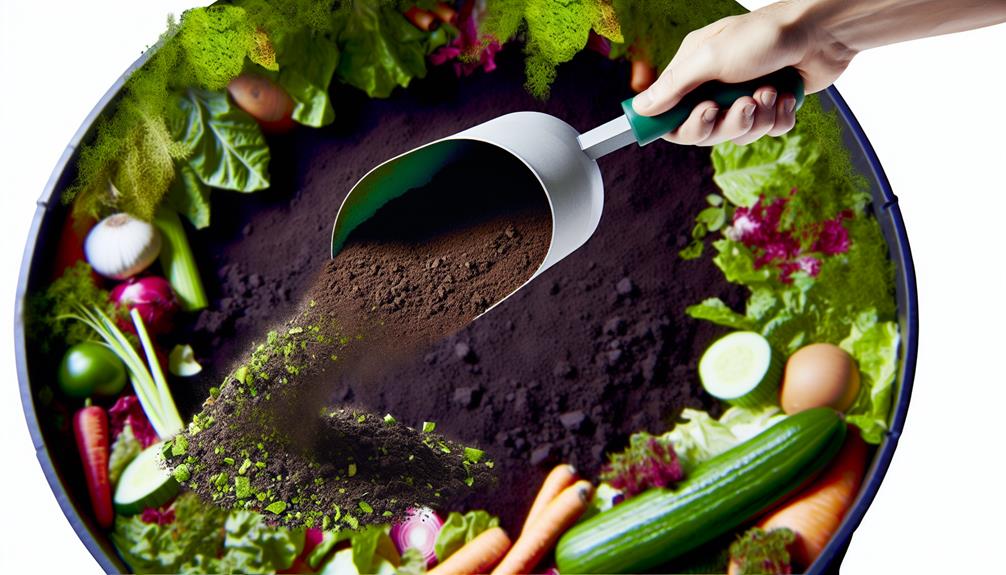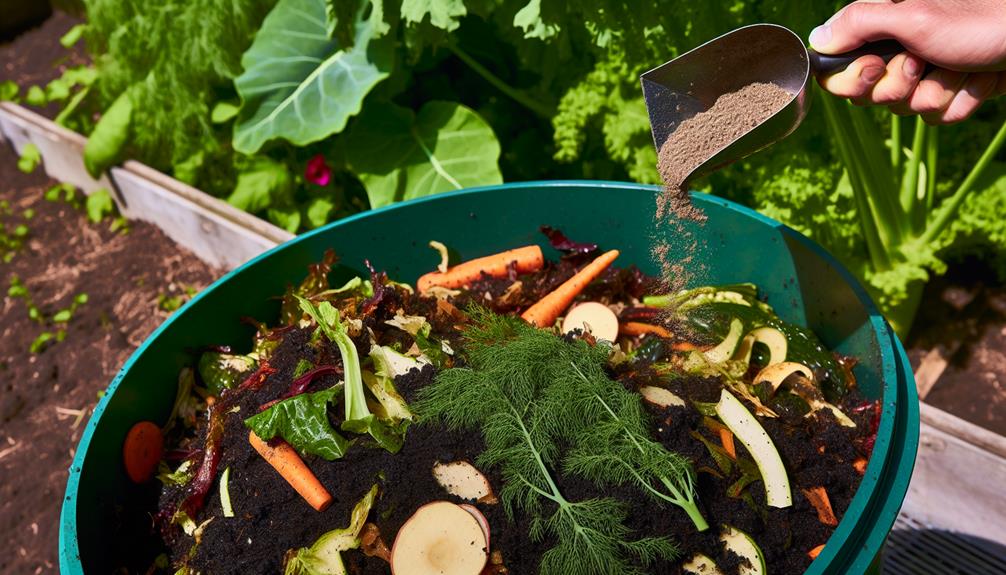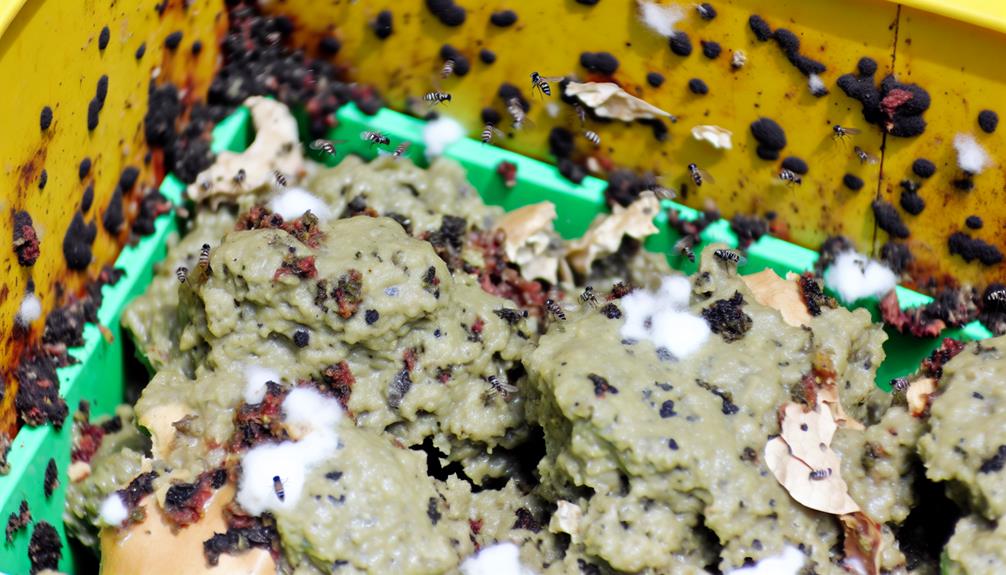

Yes, you can compost protein powder, but you need to manage it carefully. Protein powders are rich in nitrogen, which benefits compost but can cause odors and attract pests if not balanced. To compost protein powder effectively, mix it with carbon-rich materials like leaves or paper.
Guarantee proper aeration by turning the pile regularly and maintain ideal moisture levels – the compost should be damp but not soggy. Different types of protein powders might decompose at varying rates, so monitor your pile and adjust as needed. If you take these steps, you’ll be on the right track to successful composting.
Protein powder, a popular supplement among fitness enthusiasts, comes in various types like whey, casein, and plant-based options. When you’re exploring protein powders, you’ll notice they come in different flavors such as chocolate, vanilla, and strawberry. These flavors cater to various taste preferences, making it easier for you to stick to your dietary goals.
You’re not alone in this journey; many people find a flavor that makes their shake something to look forward to. The packaging types also vary, which can be beneficial depending on your lifestyle. You’ll find protein powders in large tubs, convenient for at-home use, and single-serving packets, perfect for on-the-go situations.
If you’re someone who travels frequently or hits the gym right after work, these packets can be a real game-changer. They fit easily into your bag and eliminate the need for measuring scoops. Understanding these aspects of protein powder helps you make informed choices that align with your fitness goals and daily routine.
Also Read: Can You Compost Rotten Bananas?
When composting protein powder, you should take into account its nutrient composition, starting with its macronutrient profile. Protein powders typically contain significant amounts of protein, carbohydrates, and fats, which can impact the composting process.
Additionally, analyze the micronutrient content to understand how vitamins and minerals may affect your compost’s nutrient balance.
Understanding the macronutrient profile of your protein powder helps you make informed decisions about your diet and fitness goals. Protein powder typically consists of three main macronutrients: protein, carbohydrates, and fats. Knowing the types available and sourcing ingredients is essential for selecting the right product.
Protein powders come in several types, including whey, casein, soy, and pea protein. Each type offers unique benefits and may be sourced from different ingredients, affecting its nutritional profile.
Here’s a quick breakdown:
Delving into the micronutrient content of your protein powder reveals the essential vitamins and minerals that support overall health and wellness. You’ll find that different types available on the market offer varying levels of micronutrients.
For instance, plant-based protein powders often include additional vitamins like Vitamin B12 and iron, which are vital for those on a vegetarian or vegan diet. On the other hand, whey protein powders might be fortified with calcium and Vitamin D, supporting bone health.
Keeping up with market trends, many brands now add specific micronutrients to cater to diverse health needs. Some powders are enriched with antioxidants like Vitamin C and E, while others might include magnesium and potassium to aid muscle function and recovery. It’s important to read the labels carefully to understand what each product offers.
When considering composting protein powder, the micronutrient content can affect how it interacts with the compost pile. Certain minerals, such as calcium and magnesium, can enhance the nutrient profile of the compost. However, be mindful of synthetic additives that mightn’t break down easily. Always choose products with fewer artificial ingredients to secure a more eco-friendly composting process.
Also Read: Can You Compost Ice Cream?
To begin composting, gather organic materials like fruit peels, coffee grounds, and leaves into a designated compost bin or pile. These composting materials form the foundation of your compost heap, providing the necessary nutrients for the decomposition process.

Make sure you have a balanced mix of ‘greens’ (nitrogen-rich materials) and ‘browns’ (carbon-rich materials) to keep your compost healthy and active.
Here’s what you need to do:
As these materials break down, they undergo a natural decomposition process, transforming into nutrient-rich compost that benefits your garden.
It’s a community effort, with microorganisms, worms, and insects all playing a part in breaking down the composting materials.
By following these steps, you’re not just reducing waste but also creating a sustainable environment for your plants and connecting with others who share your eco-friendly values.
Also Read: Can You Compost Mail?
Composting protein powder can enrich your soil with essential nutrients and reduce waste in your household. By adding protein powder to your compost, you contribute to a more sustainable environment. Protein powder is rich in nitrogen, an essential nutrient for healthy plant growth. When you mix it into your compost, it helps create a balanced nutrient profile, making your compost more effective in nourishing plants.
The environmental impact of composting protein powder is significant. Instead of disposing of it in the trash, where it would contribute to landfill waste and greenhouse gas emissions, you’re repurposing it into something valuable. This small change can make a big difference in reducing your household’s overall waste footprint.
There are numerous composting benefits you can enjoy. Improved soil quality leads to healthier plants, which can enhance your garden or yard. Additionally, creating your own compost reduces the need for chemical fertilizers, which can be harmful to the environment.
While composting protein powder offers numerous benefits, there are also potential pitfalls you should be mindful of to guarantee successful composting. Being aware of these challenges can help you avoid common mistakes and make the most of your composting efforts.

Firstly, protein powders, such as whey isolate or plant-based varieties, can sometimes cause an imbalance in your compost pile. High nitrogen content in these powders can lead to an unpleasant odor if not properly balanced with carbon-rich materials like leaves or paper.
Imbalance Issues:
Whey isolate and plant-based protein powders are rich in nitrogen, which can cause an imbalance if not mixed with enough carbon-rich materials.
Odor Problems:
An excess of protein powder in your compost can produce strong, unpleasant smells, which might deter you from continuing composting.
Attraction of Pests:
Protein powders can attract pests like rodents and insects, creating additional challenges in maintaining your compost pile.
Also Read: Can You Compost Rust?
Always aim to balance your compost pile by mixing protein powder with ample carbon-rich materials like leaves, straw, or shredded paper. This balance helps create an ideal environment for decomposition.
When adding whey isolate or plant-based protein powder, use them sparingly. Too much can create an imbalance, leading to a slimy, smelly pile.
Make sure the protein powder is thoroughly mixed with other compost materials. This helps distribute the nitrogen content evenly and prevents clumping.
If you’re using whey isolate, be mindful that its dairy origin can attract pests. To avoid this, bury the protein powder deeper in the pile, making it less accessible to critters.
For plant-based protein powders, remember they might break down faster due to their vegetable origin. Adjust your composting routine accordingly, turning the pile more frequently to ensure proper aeration and prevent any hotspots.
Monitor moisture levels closely. Both whey isolate and plant-based powders can alter the moisture balance. Aim for a pile that’s as damp as a wrung-out sponge. Too dry, and decomposition slows. Too wet, and you risk anaerobic conditions.
You’re wondering about the decomposition rate of protein powder in compost. It’s organic waste, so it should break down within a few months. Just make sure your compost pile is well-maintained for best decomposition.
Flavored protein powders can be composted safely. Their nutrient content boosts your compost benefits. Just make sure there’re no artificial additives. You’ll feel great knowing you’re contributing to a thriving, eco-friendly community!
When you compost protein powder, it can attract pests due to the protein odor. To safeguard against this, manage moisture control and guarantee the compost is well-balanced. Join fellow composters in creating pest-free, nutrient-rich compost!
You shouldn’t compost protein powders containing synthetic additives or potential allergens. These ingredients can harm your compost and pose risks. Stick to natural options to keep your compost healthy and inclusive for everyone.
Yes, composted protein powder can affect soil acidity and nitrogen content. When you add it to your compost, it boosts nitrogen levels, potentially altering the soil’s pH balance. Always test your soil to maintain harmony.
So, you can compost protein powder, but do it correctly. Make sure it’s plant-based or organic to avoid synthetic additives.
Mix it well with other compost materials to balance carbon and nitrogen. Monitor moisture and turn your compost regularly for best breakdown.
Avoid overloading your compost with protein powder to prevent odor issues. Follow these tips, and you’ll effectively recycle your protein powder, benefiting your garden and reducing waste.
